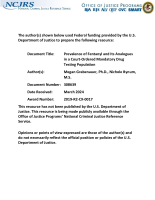Criminal population
Detecting Fentanyl Use Through Court-Ordered Mandatory Drug Testing
The Empirics of Immigration and Homicide: Evidence from California and Texas
Prevalence of Fentanyl and Its Analogues in a Court-Ordered Mandatory Drug Testing Population
Racial Disparities in the Wake of Cannabis Legalization: Documenting Persistence and Change
Data and Dashboards: Research and Enhancements to Ensure Mecklenburg County’s Criminal Justice System is a Leader in Data-Driven Decision Making
Study Protocol Paper for the Multisite Randomized Controlled Trial of Comprehensive Trauma Informed Reentry Services for Moderate to High-risk Young Males Releasing from State Prisons
Estimating Risks of Arrest and Criminal Populations: Regression Adjustments to Capture-Recapture Models
Pulling Levers: Chronic Offenders, High-Crime Settings, and a Theory of Prevention
Comparison of Sentencing Strategies Between States
Even a Little Bit Helps: An Implementation and Experimental Evaluation of Cognitive-Behavioral Therapy for High-Risk Probationers
Crime and Punishment Reconsidered - Some Comments on Blumstein's Stability of Punishment Hypothesis
Crime Deterrence, and Rational Choice
Specifying the Relationship Between Arrestee Drug Test Results and Recidivism
Tailored Functional Family Therapy Program Shows Promise for Reducing Subsequent Criminal Activity in a Population at High Risk for Joining Gangs
Changing the Behavior of Drug-Involved Offenders: Supervision That Works
A small number of those who commit crimes are heavily involved in drugs commit a large portion of the crime in this country. An evaluation of a "smart supervision" effort in Hawaii that uses swift and certain sanctioning showed that individuals committing crimes who are heavily involved in drug use can indeed change their behavior when the supervision is properly implemented.
See the YouTube Terms of Service and Google Privacy Policy
Addiction, the Brain, and Evidence-Based Treatment
The criminal justice system encounters and supervises a large number of drug abusing persons. Punishment alone is a futile and ineffective response to the problem of drug abuse. Addiction is a chronic brain disease with a strong genetic component that in most instances requires treatment. Involvement in the criminal justice system provides a unique opportunity to treat drug abuse disorders and related health conditions, thereby improving public health and safety.
See the YouTube Terms of Service and Google Privacy Policy
Alternative Sentencing Policies for Drug Offenders
The panel presentations from the 2009 NIJ Conference are based on an NIJ-sponsored evaluation of the effectiveness of Kansas Senate Bill 123, which mandates community-based drug abuse treatment for drug possession by nonviolent offenders in lieu of prison.
An Examination of Justice Reinvestment and Its Impact on Two States
Funded in part by the Bureau of Justice Assistance and the Pew Center on the States, the justice reinvestment project is a data-driven strategy aimed at policymakers to "reduce spending on corrections, increase public safety and improve conditions in the neighborhoods to which most people released from prison return." Representatives from two states where the justice reinvestment strategy is currently being implemented will discuss how it is being used to reduce the rate of incarceration and how states can reinvest in local communities.
Evidence-Based Policing: The Importance of Research and Evidence
See the YouTube Terms of Service and Google Privacy Policy



